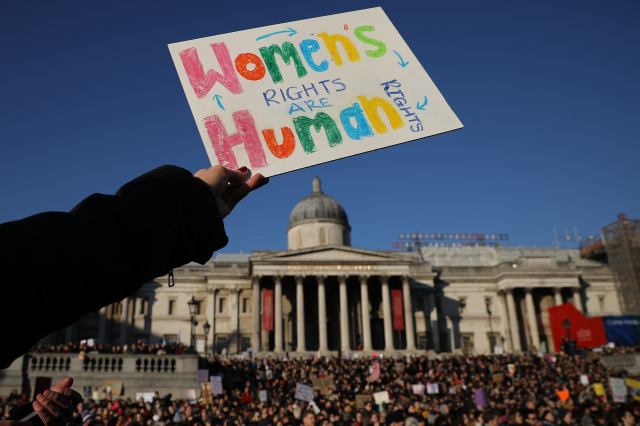Credit: Dan Kitwood/Getty Images

Imagine a country where the government is planning to take away the rights of women. Academics stay silent for the sake of their careers. Journals and professional publications retract articles and apologise for publishing work from dissident researchers. Political parties begin first to investigate and then revoke the membership of those who question. When people try to exercise their right of assembly to discuss what’s happening and venues are picketed, their phone lines are clogged with abusive calls, and sometimes there are even bomb threats and acts of violence.
Such a scenario would provoke an outcry from the international community and human rights organisations would launch an immediate inquiry. Yet this is exactly what is happening now in the UK, and leading human rights organisations, like Liberty who claim to “hold the powerful to account”, are suspiciously silent.
The threat to the rights of women comes from a proposed amendment to the Gender Recognition Act (2004). Championed by Conservative MP Maria Miller, the suggestion is to ‘streamline’ the process by which someone changes their legal gender by removing the need for a medical diagnosis and reducing the length of time an applicant needs to live in their “acquired gender”. On the surface this sounds reasonable, but the implications for women and girls are grave. In effect, a declaration of feelings of “feminine gender identity” would be all that is required for male-bodied people to access women-only services.
At present, unprecedented numbers of male-bodied prisoners are identifying as transwomen and demanding access to the female estate. Making the process of changing legal gender easier will exacerbate this problem, the burden of which is already falling on some of the most vulnerable women, those in prison. Human rights organisations such as Liberty refuse to see transgender people as anything other than vulnerable and marginalised, “forced to grow up in a society that discriminates against them, treats their identity as an illness, and fails to recognise their true selves”. We are living at a time when the use of stickers bearing the words ‘women do not have penises’ is being investigated as a hate crime. The reticence of groups to speak out is understandable, but ultimately unforgivable.
Since the proposal to amend the Gender Recognition Act was announced, grassroots feminist discussion groups have sprung-up across the UK, with talks organised by We Need to Talk, Woman’s Place UK and Let a Woman Speak. Earlier this year I spoke at one of these talks – after sustained pressure from transgender activists the original venue had to cancel the booking at less than 24-hours notice, and the organisers were left scrambling to find a new venue. In June, the same group were the subject of a bomb threat. Just last week, in Plymouth, a listed building that had hosted a similar discussion was covered in graffiti and posters by those opposed to women’s free speech. The event organisers are now trying to raise money to cover the cost of the clean-up. These are not isolated incidents, they are part of a concerted campaign of intimidation designed to stop women from meeting to discuss their rights.
Women who persist, those who deviate from the mantra ‘transwomen are women’, are smeared as TERFs (an acronym for ‘trans exclusionary radical feminists’) and frequently reported to their employers, political parties and even religious leaders. Self-appointed social justice warriors online lurk in discussion groups to report women for ‘transphobia’. Hashtags such as #punchaterf and #fuckterfs are used to incite hatred and violence against those who question the validity of gender identity.
Freedom of assembly is fundamental to a functioning democracy. And yet, from the heart of the establishment to the lunatic fringe of masked extremists, there is no question that women are being intimidated by constant efforts to stop discussion of the Gender Recognition Act. Whether one agrees or not, demands to shut down debate and the dehumanisation of those with unpopular beliefs should ring alarm bells.
Given the violence, actual and threatened, and the sustained harassment of women who persist in thinking biological sex is important in a sexist society, it is not unreasonable to ask what human rights organisations are doing to protect the freedom of assembly here in the UK. Liberty boasts a laudable aim “to protect basic rights and freedoms through the courts, in Parliament and in the wider community” so one wonders: where is their statement in defence of women meeting to discuss their rights?
In a joint statement, Liberty, the British Institute of Human Rights and Amnesty International announced their support for Maria Miller’s proposals, arguing the “announcement is long overdue as transphobia, disinformation and prejudice have been spread by a small number of people opposing equality for trans people”. Human rights organisations have stopped listening to those they ought to represent and have instead become lumbering corporate beasts chasing an ever narrowing definition of ‘inclusive’ – one that excludes feminist women.
It should be a source of shame that this battle has been left to largely unfunded groups of women. Elected officials and esteemed human rights organisations charged with defending our freedoms have either ignored the controversy or actively colluded in the silencing and shaming of feminists. Today’s smug declarations about the ‘right side of history’ will do nothing to protect the next generation of women and girls whose rights are at risk of being virtue-signalled away. I wonder, in five years time if I’m on trial for hate speech for having written this article, whose side will Liberty be on?










Join the discussion
Join like minded readers that support our journalism by becoming a paid subscriber
To join the discussion in the comments, become a paid subscriber.
Join like minded readers that support our journalism, read unlimited articles and enjoy other subscriber-only benefits.
Subscribe